 All Africa is an informal market, from Cape to Cairo, from Maputo to Marrakesh. And everything can be found; no VAT, no paperwork and sometimes even without having to leave the car. Briberies, embezzlements, speculation, benefits, manipulation, corruption. Things which are really handy, or might suddenly become so tomorrow.
All Africa is an informal market, from Cape to Cairo, from Maputo to Marrakesh. And everything can be found; no VAT, no paperwork and sometimes even without having to leave the car. Briberies, embezzlements, speculation, benefits, manipulation, corruption. Things which are really handy, or might suddenly become so tomorrow.
I'll visit
15.01.2011 | by Nuno Milagre
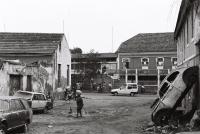 The Bar-Stool Edible Worm
I’m against everything
Against war and those against
War. Against whatever diminishes
Th’ individual’s blind impulse.
The Bar-Stool Edible Worm
I’m against everything
Against war and those against
War. Against whatever diminishes
Th’ individual’s blind impulse.
Mukanda
14.01.2011 | by Dambudzo Marechera
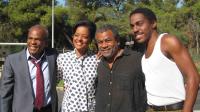 Our interview takes place in Ipanema, Rio de Janeiro, where Zézé Gamboa and a few members of his team are resting for a few days after the intense shoot for his film “Grande Kilapy”, which tells the story of Joãozinho das Garotas, an Angolan during colonial times who engineered a sting with the colony’s finances. There’s just a week in Luanda left for the film to be ready for editing, following the takes in Portugal and Paraíba in Brazil, so this is the right time to weigh up the experience and bring to public attention some aspects of the work done by someone who is considered to be “the most consistent” of Angolan directors.
Our interview takes place in Ipanema, Rio de Janeiro, where Zézé Gamboa and a few members of his team are resting for a few days after the intense shoot for his film “Grande Kilapy”, which tells the story of Joãozinho das Garotas, an Angolan during colonial times who engineered a sting with the colony’s finances. There’s just a week in Luanda left for the film to be ready for editing, following the takes in Portugal and Paraíba in Brazil, so this is the right time to weigh up the experience and bring to public attention some aspects of the work done by someone who is considered to be “the most consistent” of Angolan directors.
Afroscreen
10.01.2011 | by Marta Lança
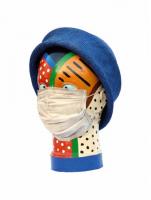 To interpret what it means to be a traveller – in present day terms – is a multifaceted exercise, put in the spotlight even further by the geography and culture that define the point of departure and that of arrival. Human “latitude” is what you find between the distance travelled from the beginning to the end. For many, it’s an agent provocateur that creates a field of artistic and intellectual experimentation where the force of innocuous space takes us to all sorts of exchanges and the construction of new concepts.
To interpret what it means to be a traveller – in present day terms – is a multifaceted exercise, put in the spotlight even further by the geography and culture that define the point of departure and that of arrival. Human “latitude” is what you find between the distance travelled from the beginning to the end. For many, it’s an agent provocateur that creates a field of artistic and intellectual experimentation where the force of innocuous space takes us to all sorts of exchanges and the construction of new concepts.
Face to face
02.01.2011 | by Jorge Rocha
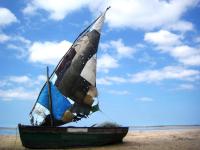 fter some back and forth travelling Lisbon-Madrid-Lisbon and some other back and forth travelling Maputo-Johannesburg-Maputo, I started finding linkage points between the voyage in the European Southwest and the voyage in the African Southeast. Both courses are about 375 miles long, from country to country, from capital to capital; syntonizing into another idiom when crossing the border, changing the bank notes for others – a step no longer necessary in the Iberian Peninsula. These are voyages in longitude, to the Orient: Madrid and Maputo; to the Occident: Lisbon and Johannesburg.
fter some back and forth travelling Lisbon-Madrid-Lisbon and some other back and forth travelling Maputo-Johannesburg-Maputo, I started finding linkage points between the voyage in the European Southwest and the voyage in the African Southeast. Both courses are about 375 miles long, from country to country, from capital to capital; syntonizing into another idiom when crossing the border, changing the bank notes for others – a step no longer necessary in the Iberian Peninsula. These are voyages in longitude, to the Orient: Madrid and Maputo; to the Occident: Lisbon and Johannesburg.
I'll visit
17.12.2010 | by Nuno Milagre
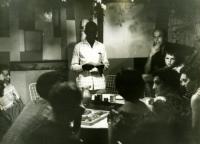 In contrast to the context of Francophile Africa, where the main interest was in literary works and an idea of blackness that involved the relatively contentious appropriation of European modernity, certain mediators, located further south, questioned the possible evolution of local cultures and of their own major artistic traditions, free from the subordination of European models, which were viewed in a critical way in terms of the visual arts. Within the framework of the inevitable death of the tribal art which was characteristic of traditional societies (even via tourist reproductions), new and spontaneous forms of artistic production (and also sophisticated forms of syncretism in the case of "natural synthesis" proposed by Uche Okeke in the Zaria School) were being sought without any nativist essentialism (in the cases of Beier, Guedes and Beinart).
In contrast to the context of Francophile Africa, where the main interest was in literary works and an idea of blackness that involved the relatively contentious appropriation of European modernity, certain mediators, located further south, questioned the possible evolution of local cultures and of their own major artistic traditions, free from the subordination of European models, which were viewed in a critical way in terms of the visual arts. Within the framework of the inevitable death of the tribal art which was characteristic of traditional societies (even via tourist reproductions), new and spontaneous forms of artistic production (and also sophisticated forms of syncretism in the case of "natural synthesis" proposed by Uche Okeke in the Zaria School) were being sought without any nativist essentialism (in the cases of Beier, Guedes and Beinart).
To read
17.12.2010 | by Alexandre Pomar
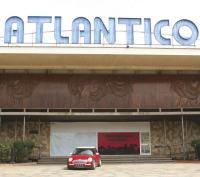 The cinemas in Angola are points of reference in the towns where they found a home. And there are many of them. It’s the kind of infrastructure that you find all over the country, because their heyday started way before independence, allowing the Portuguese colonial authorities to take entertainment – but especially regime propaganda – all over the country. What remains for the telling are the architectural lines, the pleasure for shows and multi-purpose spaces.
The cinemas in Angola are points of reference in the towns where they found a home. And there are many of them. It’s the kind of infrastructure that you find all over the country, because their heyday started way before independence, allowing the Portuguese colonial authorities to take entertainment – but especially regime propaganda – all over the country. What remains for the telling are the architectural lines, the pleasure for shows and multi-purpose spaces.
City
13.12.2010 | by Miguel Gomes
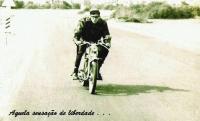 The beard was long and white and the hair long too but flowing loose. The face was burnt by the sun and an enormous love for the Namibe desert, where he had spent his childhood . He had been enchanted by the dunes, which looked to him like mountains of gold glittering in the distance. Samuel Aço is the main force behind the Centro de Estudos do Deserto (Centre for Desert Studies). This is an association in the heart of Namibe, in southern Angola, delving into the secrets of one of the country's most inhospitable regions.
The beard was long and white and the hair long too but flowing loose. The face was burnt by the sun and an enormous love for the Namibe desert, where he had spent his childhood . He had been enchanted by the dunes, which looked to him like mountains of gold glittering in the distance. Samuel Aço is the main force behind the Centro de Estudos do Deserto (Centre for Desert Studies). This is an association in the heart of Namibe, in southern Angola, delving into the secrets of one of the country's most inhospitable regions.
Face to face
09.12.2010 | by Pedro Cardoso
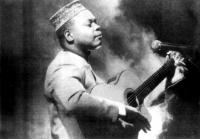 He sings the sounds of the earth, though it was the Beatles who woke everyone up to the range of melodies that are to be found in the musical scale. Filipe Mukenga’s career has been acknowledged both at home and abroad and is part of the generation that saw an explosion of music in Angola during the 60’s and 70’s.
He sings the sounds of the earth, though it was the Beatles who woke everyone up to the range of melodies that are to be found in the musical scale. Filipe Mukenga’s career has been acknowledged both at home and abroad and is part of the generation that saw an explosion of music in Angola during the 60’s and 70’s.
Stages
07.12.2010 | by Mário Rui Silva
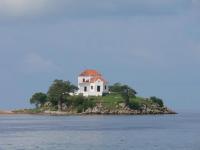 The triangular trade relationship liking Africa and Europe is well known. The “dark continent” supplied the slave labour that America needed, and indeed contributed to its growth, expansion and development. Slave labour also fed into European commercial interests, also generating economic, social, technological, cultural and other development. It is an issue which had repercussions in the relationship between the three continents and its consequences are still the subject of debate, as demographic studies illustrate.
The triangular trade relationship liking Africa and Europe is well known. The “dark continent” supplied the slave labour that America needed, and indeed contributed to its growth, expansion and development. Slave labour also fed into European commercial interests, also generating economic, social, technological, cultural and other development. It is an issue which had repercussions in the relationship between the three continents and its consequences are still the subject of debate, as demographic studies illustrate.
To read
29.11.2010 | by Aurora da Fonseca Ferreira
 Meirinho has a voice which conveys conviction, the look in his eye is steadfast, his body unflinching, though bursting at times with a provocative impetuosity. He is an actor with great vitality: his energy spills over and has to be worked on with the discipline that the theatre demands. And this at times is difficult because Meirinho is, as a person, over the top. But this very feature, channelled into the theatre, can give birth to genius.
Meirinho has a voice which conveys conviction, the look in his eye is steadfast, his body unflinching, though bursting at times with a provocative impetuosity. He is an actor with great vitality: his energy spills over and has to be worked on with the discipline that the theatre demands. And this at times is difficult because Meirinho is, as a person, over the top. But this very feature, channelled into the theatre, can give birth to genius.
Face to face
29.11.2010 | by Marta Lança
 n his new exhibition project In the skin of the city (Na pele da cidade) António Ole talks about space. It is about his hometown Luanda, but could be any other city as well. A place, where he stopped on one of his many travels, to absorb it's particularity. To absorb and let it be inscribed into his very own skin. In the past years he has seen many places during his travels for various exhibitions in the international art-world.
n his new exhibition project In the skin of the city (Na pele da cidade) António Ole talks about space. It is about his hometown Luanda, but could be any other city as well. A place, where he stopped on one of his many travels, to absorb it's particularity. To absorb and let it be inscribed into his very own skin. In the past years he has seen many places during his travels for various exhibitions in the international art-world.
Face to face
27.11.2010 | by Nadine Siegert
 Vast Namibe is a beautiful book of photographs by Jorge Ferreira “on landscapes, people, animals and plants in the province of Namibe” with text and captions by Cristina U. Rodrigues and graphic design of João Ribeiro Soares.
Vast Namibe is a beautiful book of photographs by Jorge Ferreira “on landscapes, people, animals and plants in the province of Namibe” with text and captions by Cristina U. Rodrigues and graphic design of João Ribeiro Soares.
Ruy Duarte de Carvalho
25.11.2010 | by Cristina Salvador
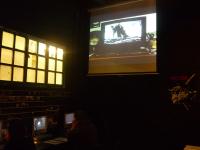 Starting from original political determinations of Mozambican propaganda films, the Off-screen method induces or just identifies the unfolding of relational transformations that are raised basically from putting perception itself at play. It suggest that archive genealogy or any other documentary organization approach combines a relational process with a sizeable shift to the realm of the (political) present.
Starting from original political determinations of Mozambican propaganda films, the Off-screen method induces or just identifies the unfolding of relational transformations that are raised basically from putting perception itself at play. It suggest that archive genealogy or any other documentary organization approach combines a relational process with a sizeable shift to the realm of the (political) present.
Afroscreen
25.11.2010 | by Catarina Simão
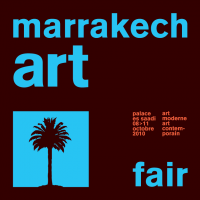 The Museum of Marrakech, situated in the heart of the old Medina, hosted Resonnance exhibition featuring a number of works by artists of Moroccan origins. Painting, photography, video art, graphic design, all the artistic forms gathered in this collective exhibition to celebrate the rich cultural background that brought into the artistic scene those artists: Mounir Fatmi, Aziza Alaoui, Chourouk Hriech, Mohamed El Baz, Lalla Essaydi, Malik Nejmi and others.
The Museum of Marrakech, situated in the heart of the old Medina, hosted Resonnance exhibition featuring a number of works by artists of Moroccan origins. Painting, photography, video art, graphic design, all the artistic forms gathered in this collective exhibition to celebrate the rich cultural background that brought into the artistic scene those artists: Mounir Fatmi, Aziza Alaoui, Chourouk Hriech, Mohamed El Baz, Lalla Essaydi, Malik Nejmi and others.
I'll visit
25.11.2010 | by Hasnae Fathi
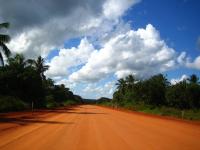 One Swahili word would travel to integrate countless different languages: safari, meaning ‘journey’. Turks, Chileans, Indonesians, Swedish, Australians and Lithuans, together with many more inhabitants of all the five continents, all understand this word, because it is part of their vocabulary, although in the stricter sense of a journey for wild life observation.
One Swahili word would travel to integrate countless different languages: safari, meaning ‘journey’. Turks, Chileans, Indonesians, Swedish, Australians and Lithuans, together with many more inhabitants of all the five continents, all understand this word, because it is part of their vocabulary, although in the stricter sense of a journey for wild life observation.
I'll visit
22.11.2010 | by Nuno Milagre
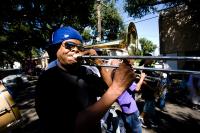 After Slavery was abolished, there were many Social Aid and Pleasure Clubs formed in New Orleans which were benevolent societies that organized social activities, provided funerals for the members and helped maintain the tradition alive. When people doubted that New Orleans could be reborn form Hurricane katrina, it was those societies and many other traditions that live in the hearts of the people that motivated them to return and rebuild their lives in the city they love.
After Slavery was abolished, there were many Social Aid and Pleasure Clubs formed in New Orleans which were benevolent societies that organized social activities, provided funerals for the members and helped maintain the tradition alive. When people doubted that New Orleans could be reborn form Hurricane katrina, it was those societies and many other traditions that live in the hearts of the people that motivated them to return and rebuild their lives in the city they love.
City
17.11.2010 | by José Fernandes
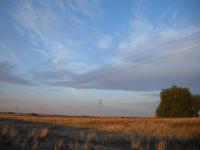 Ruy Duarte de Carvalho, who recently left this world, lived a life associated to traveling, which incidentally is one of the favorite themes of his books - a production that goes beyond a dozen, including poetry, fiction and essay. With the course of agricultural regent, which he concluded in 1960, went through big part of the Angolan territory working on coffee plantations and also in traditional agro-pastoral production, taking care of sheep in Caranculo, in the (then) province of Moçâmedes, now Namibe.
Ruy Duarte de Carvalho, who recently left this world, lived a life associated to traveling, which incidentally is one of the favorite themes of his books - a production that goes beyond a dozen, including poetry, fiction and essay. With the course of agricultural regent, which he concluded in 1960, went through big part of the Angolan territory working on coffee plantations and also in traditional agro-pastoral production, taking care of sheep in Caranculo, in the (then) province of Moçâmedes, now Namibe.
Ruy Duarte de Carvalho
13.11.2010 | by Marta Lança
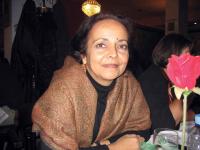 born in Huíla, in the midst of an unjust colonial society. There were pastors there. What I owe to the Nyaneka society is poetry, music, the sense of smell, southern orientation. Contact (for anyone in the process of assimilation) was forbidden to us. And it was for this very reason stronger. To learn and to know who they were and who we were was always linked to the paradigm of orality, the flame that wells from being of a place, being aware of the cycles, respect for difference, and an abhorrence of injustice.
born in Huíla, in the midst of an unjust colonial society. There were pastors there. What I owe to the Nyaneka society is poetry, music, the sense of smell, southern orientation. Contact (for anyone in the process of assimilation) was forbidden to us. And it was for this very reason stronger. To learn and to know who they were and who we were was always linked to the paradigm of orality, the flame that wells from being of a place, being aware of the cycles, respect for difference, and an abhorrence of injustice.
Face to face
07.11.2010 | by Pedro Cardoso
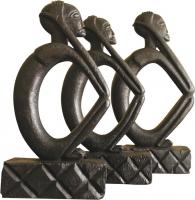 Kundi had succeeded Iala Maku, and now he was getting old. Harmony among the peoples of Lunda was getting strained. Who would succeed the old man Kundi? One of the boys? Tchinguri or Tchinhama? Or the girl, Lwéji, the youngest daughter of his second wife? They say the brothers could not get on together. Tchinguri was more dashing, Tchinhama more thoughtful. However that may be, one day the boys burst into their father's tchota (palace), drunk as lords on palm wine and went for the old man because both of them wanted to take over. The old man was half blind and dying, but he cursed them and told them there and then that neither of them would take his place. He called the macotas (the elders) and said he was handing over to Lwéji, the boys' half-sister. And so the Muatyânvua empire started in heh village of Mussumba, with the marriage of Lwéji, the new Lunda queen, to the Baluba hunter Tchibinda Ilunga.
Kundi had succeeded Iala Maku, and now he was getting old. Harmony among the peoples of Lunda was getting strained. Who would succeed the old man Kundi? One of the boys? Tchinguri or Tchinhama? Or the girl, Lwéji, the youngest daughter of his second wife? They say the brothers could not get on together. Tchinguri was more dashing, Tchinhama more thoughtful. However that may be, one day the boys burst into their father's tchota (palace), drunk as lords on palm wine and went for the old man because both of them wanted to take over. The old man was half blind and dying, but he cursed them and told them there and then that neither of them would take his place. He called the macotas (the elders) and said he was handing over to Lwéji, the boys' half-sister. And so the Muatyânvua empire started in heh village of Mussumba, with the marriage of Lwéji, the new Lunda queen, to the Baluba hunter Tchibinda Ilunga.
To read
31.10.2010 | by Carlos Lousada